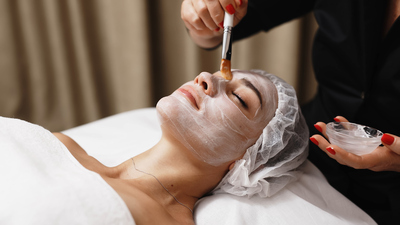What is a Chemical Peel Why It Should Be Your Next Treatment?
By Maggie Listhaus, PA-C

If you’re too impatient like me to wait around for those topical retinoids and acne medications to take effect, peels are your answer! They turn over your skin cells and clean out your pores at a MUCH faster rate. Peels are made up of various agents that when applied to your skin, induce controlled exfoliation of the skin cells, as well as, increase dermal volume (plump your skin) and increase collagen production (anti-aging). What could be better?!
Types of Chemical Peels and What They Do
Salicylic Acid Peels:
This peel is generally safe for all skin types and has minimal discomfort and downtime after applied. It penetrates pores better than other acids, so it is a great choice of peel for someone with stubborn skin issues.
Works best for:
- Blackheads
- Sunspots
- Acne
- Fine Lines
- Freckles
Glycolic Acid Peels:
Glycolic acid is obtained from sugarcane, rejuvenates the skin and gives your skin that perfect natural radiance. It is the perfect peel to get before any event because of its minimal downtime and flawless post peel glow.
Works best for:
- Acne
- Acne Dark Marks
- Clogged Pores
Learn more about Glycolic Peels here.
Jessner Peel:
The Jessner peel is a combination of salicylic acid 14%, lactic acid 14%, and resorcinol 14% in alcohol. This peel is fast, easy and can be applied with trichloroacetic acid on top for a more intense peel treatment.
Works best for:
- Acne Dark Marks
- Sun Spots
ViPeel:
The VIpeel is a combination peel that contains trichloroacetic acid, retinoids, salicylic acid, phenol, and vitamin C. It produces peeling of the skin for about 1-week post- treatment. This peel is safe for all skin types and is generally very well tolerated.
Works best for:
- Acne
- Acne Scars
- Dark Marks
- Fine Lines
Learn more about ViPeels here.
Things to Know Before Getting a Chemical Peel
- You should let your provider know if you have a history of oral herpes, so you can be properly treated before getting a peel.
- You should not get a peel if you have an untreated skin cancer on the face.
- If you have active psoriasis or eczema on the face, a peel is not recommended.
- For deeper peels., you should let your provider know if you have a history of poor healing or keloids.
- These peels are not permitted while pregnant or breastfeeding.
- After getting a peel sun avoidance for at least 1-2 weeks is crucial as the new skin cells are forming and replacing the old ones.
Learn more about the chemical peel treatments available at Schweiger Dermatology. Peel Happy!
